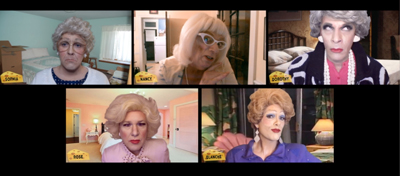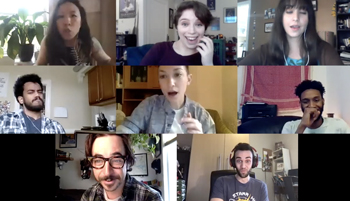
As the Long Intermission of 2020 approaches the six-month mark, theater artists have begun to address the craving of audiences for brand-new written-from-scratch PLAYS. In a city famous for its visceral ensemble aesthetic, however, significant paradigm shifts are needed to create stories devoid of nose-to-nose shouting matches, full-body hugs, or sweat-soaked violence (although in Theater Wit's Teenage Dick, Almanya Narula choreographed a locker-room fight adhering to social-distancing regulations, while still delivering the requisite slams and crashes).
First out of the gate were the shows already structured in episodic segments—The Annoyance "Quaranteam" comedy revue Out of Touch, or The Neofuturists' thirty-plays-in-sixty-minutes Infinite Wrench. Next came Black Button Eyes' Masque of the Red Coronavirus, a collage of variety acts reflecting a theme hearkening to Poe's shivery tale, followed by Passage Theatre's symposial All-One! The Dr. Bronner Story, its text scored for solo thespians forced to, literally, phone in their performances.
As artists accustomed to interactive endeavor explored the challenges associated with maintaining an illusion of group dynamics, techniques for "headshot acting" started to emerge—for example, an increasing reliance on faces, rather than bodies, for emotional expression, or a more diligent awareness of personal habits (e.g. sniffing, lip-licking) rendered suddenly visible in close-up.
Magicians, whose art is so inextricably linked to the concept of willing deception, were the first to pinpoint the importance of connection with unseen spectators.
 David Parr, whose Sorcerer's Lair zooms from Poe's Magic Theatre in Baltimore (despite its legerdemain originating in Milwaukee), comments on the difficulty of talking to a camera "as if it were a friend." With audience microphones muted, says Parr, instead of immediate feedback in the form of audible reactions, "I have to rely on visual cues for gauging audience response. The strange silence takes some getting used to."
David Parr, whose Sorcerer's Lair zooms from Poe's Magic Theatre in Baltimore (despite its legerdemain originating in Milwaukee), comments on the difficulty of talking to a camera "as if it were a friend." With audience microphones muted, says Parr, instead of immediate feedback in the form of audible reactions, "I have to rely on visual cues for gauging audience response. The strange silence takes some getting used to."Mentalist Neil Tobin concurs, "One of the biggest problems with magic on screen is providing assurance that it's not being accomplished by technological means. Shows like Fool Us or America's Got Talent have judges and a studio audience to validate the genuineness necessary to generate an appropriate level of trust, but many magicians now performing on Zoom or Facebook Live are developing material that permits participation by viewers in the conference room or at home."
Online protocol can also be a staging element in its own right, as when Danny Rudnick and Lee Benzaquin, two of the magicians featured in a round-robin video marathon of the classic "Ambitious Card" stunt appear to scatter a deck of cards from one virtual window into the next, while Hell In A Handbag's latest in their series of Golden Girls drag spoofs incorporates the multiple-frame screen picture into a storyline revolving on a quarantine generated by a 1992 outbreak of Legionnaire's Disease—a premise explaining why the housemates are reduced to trading repartee (via blatantly anachronistic technology) from their individual bedrooms. The currently-streaming Shakespeare All-Stars adaptation of Shakespeare's The Tempest—relocated on a remote space station ruled by Prospera, the exiled Duke of Milan—likewise employs such hi-tech special effects as animated puppetry and slo-mo focus.
 Back to Love's Labour's Lost, however—now titled Groups of Ten or More People. From the very beginning of the Shutdown, co-author Gaby Labotka recognized the opportunities for a LLL set during the pandemic, "The story has people choosing to isolate themselves, and a family elder who dies suddenly and mysteriously. This is a context familiar to modern audiences—so why not do it NOW?"
Back to Love's Labour's Lost, however—now titled Groups of Ten or More People. From the very beginning of the Shutdown, co-author Gaby Labotka recognized the opportunities for a LLL set during the pandemic, "The story has people choosing to isolate themselves, and a family elder who dies suddenly and mysteriously. This is a context familiar to modern audiences—so why not do it NOW?"A call for artists interested in collaborating on "Isolation Theatre" Shakespeare brought Zach Barr on board as well as an ensemble of actors eager to experiment—some of whom Labotka and Barr confess to never having met in person. Far from impeding the collective progress, reports Barr, the distance factor "gives the final product an emotional honesty that can't be ignored."
"What we have is a hilarious and heartwarming story brimming with dramatic irony" Labotka declares, while Barr adds, "It's been a delight to wrestle with stylistic conventions drawn from both Elizabethan-era theater and the newly-fledged field of digital performance."
Groups of Ten Or More People streams in an open run. Tickets and intel: www.facebook.com/littlebraintheatre/
The Tempest streams though July 31. Tickets and intel: www.shakespeareallstars.com
The Golden Girls: The Lost Episodes, Volume 4-LOCKDOWN streams through August 15. Tickets and intel: www.handbagproductions.org
The Sorcerer's Lair zooms bi-monthly from Poe's Magic Theatre. Tickets and intel: www.davidparr.com or www.poesmagic.com
Masque of the Red Coronavirus streams in an open run. Tickets and intel: www.blackbuttoneyes.com
Mary Shen Barnidge
Contributing Writer
